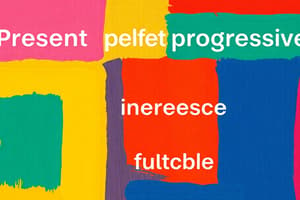Podcast
Questions and Answers
Which tense is commonly used to express intentions, offers, requests, threats, promises, and announcements of decisions?
Which tense is commonly used to express intentions, offers, requests, threats, promises, and announcements of decisions?
- Simple Present
- `will` / `shall` + infinitive (correct)
- Future Perfect
- Present Progressive
The simple present tense cannot be used to talk about future events.
The simple present tense cannot be used to talk about future events.
False (B)
To indicate that a future event is very close, use be ______ to + infinitive.
To indicate that a future event is very close, use be ______ to + infinitive.
about
How do you express a future event that is part of a plan, arrangement, schedule, or instruction?
How do you express a future event that is part of a plan, arrangement, schedule, or instruction?
Which of the following sentences uses present progressive to talk about the future?
Which of the following sentences uses present progressive to talk about the future?
In subordinate clauses referring to the future, you typically use will + infinitive.
In subordinate clauses referring to the future, you typically use will + infinitive.
Which tense is best to describe an action that will be completed by a certain time in the future?
Which tense is best to describe an action that will be completed by a certain time in the future?
To say something was still in the future at a certain past time, use a past form of one of the future structures, also known as '______ in the past'.
To say something was still in the future at a certain past time, use a past form of one of the future structures, also known as '______ in the past'.
Give an example of a sentence using the simple present to refer to the future.
Give an example of a sentence using the simple present to refer to the future.
Match the tense with its primary use for future events:
Match the tense with its primary use for future events:
Which sentence exemplifies the use of will to make a prediction?
Which sentence exemplifies the use of will to make a prediction?
Shall is commonly used in American English to make suggestions or offers.
Shall is commonly used in American English to make suggestions or offers.
This time tomorrow, I ______ be lying on the beach.
This time tomorrow, I ______ be lying on the beach.
What is the function of the future progressive tense?
What is the function of the future progressive tense?
Which sentence uses the present progressive to indicate a future arrangement?
Which sentence uses the present progressive to indicate a future arrangement?
Using present tenses to refer to the future is uncommon in spoken English.
Using present tenses to refer to the future is uncommon in spoken English.
By next year, I ______ have graduated from college.
By next year, I ______ have graduated from college.
How can you express a prediction that a future event is certain to happen?
How can you express a prediction that a future event is certain to happen?
Match the phrase with its correct description:
Match the phrase with its correct description:
Which sentence below accurately uses be to + infinitive?
Which sentence below accurately uses be to + infinitive?
The phrase 'something was going to happen' is an example of a 'future in the past' construction.
The phrase 'something was going to happen' is an example of a 'future in the past' construction.
In subordinate clauses referring to the future, we mostly use present tenses instead of will+______.
In subordinate clauses referring to the future, we mostly use present tenses instead of will+______.
When is it appropriate to use 'be about to + infinitive'?
When is it appropriate to use 'be about to + infinitive'?
Match the sentence with its implication:
Match the sentence with its implication:
Which of the following sentences uses the future progressive correctly?
Which of the following sentences uses the future progressive correctly?
Flashcards
Present-tense forms for future
Present-tense forms for future
Use present-tense forms for future events already planned, decided, or visibly on the way.
Will/shall + infinitive
Will/shall + infinitive
Use 'will/shall + infinitive' for giving future information or discussing undecided, non-obvious events.
Simple present for future
Simple present for future
The simple present can express future events, but limited to fixed schedules.
Future perfect tense
Future perfect tense
Signup and view all the flashcards
Future progressive tense
Future progressive tense
Signup and view all the flashcards
Be about to + infinitive
Be about to + infinitive
Signup and view all the flashcards
Be to + infinitive
Be to + infinitive
Signup and view all the flashcards
'Future in the past'
'Future in the past'
Signup and view all the flashcards
Subordinate clauses & future
Subordinate clauses & future
Signup and view all the flashcards
Study Notes
Present Tense Forms
- Present tense forms like "I'm leaving" and "I'm going to leave" are used for future events with a present reality, such as plans, decisions, or events that are already in motion.
- The present progressive tense is commonly used in this context.
- The present progressive of "go" (be going to) functions as an auxiliary verb to discuss the future.
- Present tense forms are particularly common in speech when discussing planned future events.
Will/Shall
- "Will" (or sometimes "shall") + infinitive is used to convey information about the future or potential events that are not yet decided or evident.
- This construction is a common way to refer to the future.
- "Will" (and sometimes "shall") indicates intentions and attitudes towards others and frequently appears in offers, requests, threats, promises, and announcements of decisions.
Simple Present
- The simple present tense can refer to the future, but in specific situations.
- "The train leaves at half past six tomorrow morning"
Future Perfect
- The future perfect indicates that something will be completed, finished, or achieved by a specific time.
- "By next Christmas we'll have been here for eight years"
Future Progressive
- The future progressive describes an action that will be in progress at a particular time.
- "This time tomorrow I'll be lying on the beach"
Be About To + Infinitive
- "Be about to + infinitive" shows that a future event is imminent.
- "The plane's about to take off"
Be To + Infinitive
- "Be to + infinitive" is used for plans, arrangements, schedules, and instructions.
- "The President is to visit Beijing"
- "You're not to tell anybody"
Future In The Past
- To express something that was still in the future at a certain point in the past, the past form of a future structure can be used.
- "Something was going to happen that was to change the world"
- "I knew she would arrive before long"
Subordinate Clauses
- In many subordinate clauses, present tenses are used instead of "will + infinitive" to refer to the future.
- "Phone me when you have time"
- "I'll follow him wherever he goes"
Studying That Suits You
Use AI to generate personalized quizzes and flashcards to suit your learning preferences.




